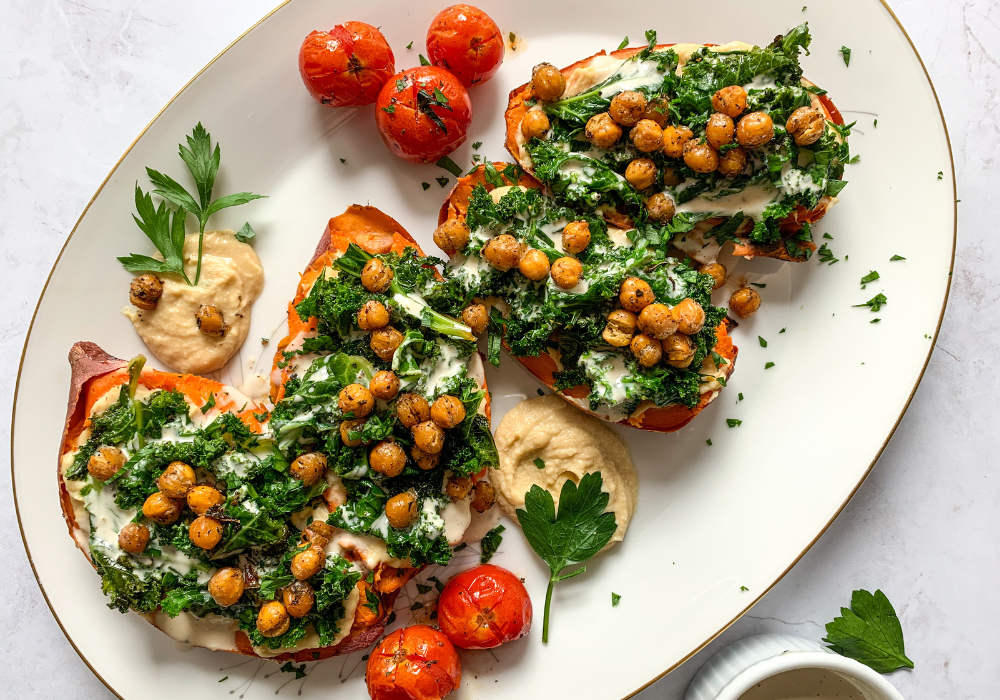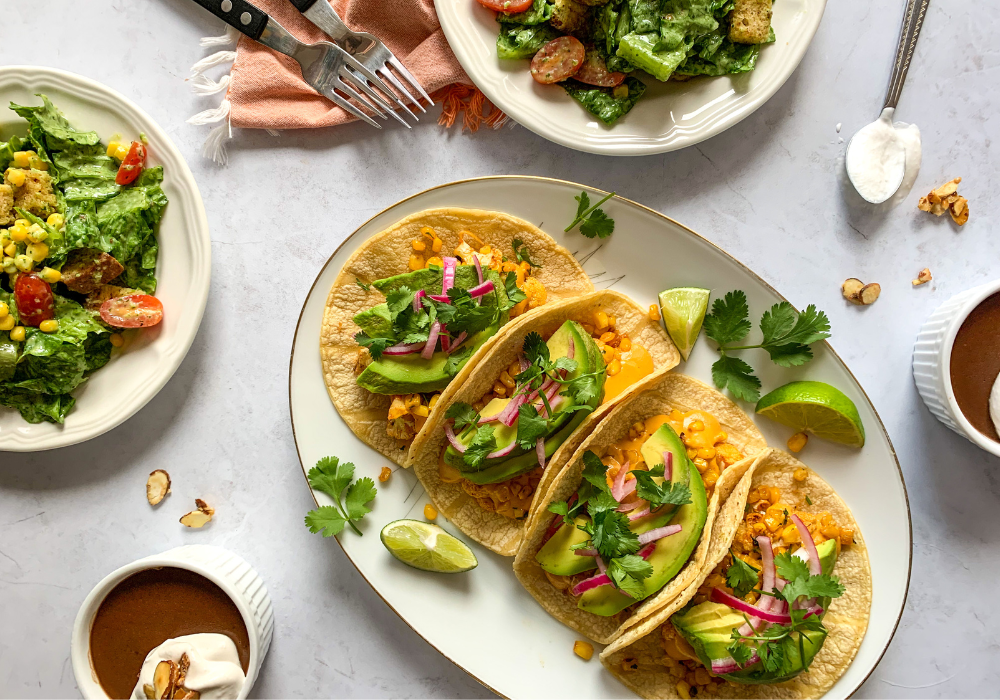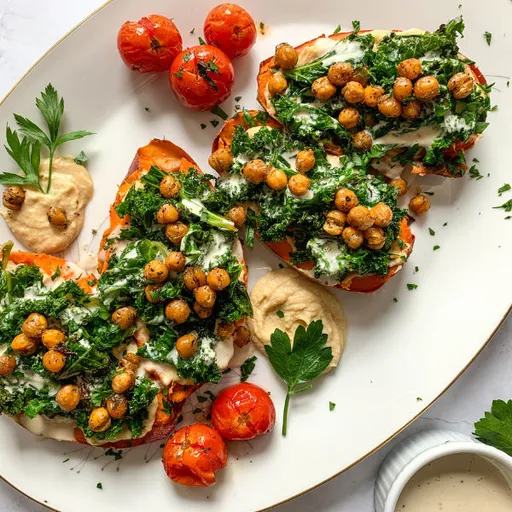Today, I’m debunking some of the most common plant-based diet myths. These are concerns about eating plant-based that I hear often and might be stopping you from adopting this super healthy diet.
Whether you’re considering adding more plants to your diet or already eating a plant-based diet and not feeling fulfilled, this blog post will help ease some of your worries and allow you to fully embrace this new delicious lifestyle.
Let’s bust some common plant-based diet myths!

Myth #1: A plant-based diet is too restrictive
This is a concern I hear all the time. The questions, “But what will I eat?” and “So what can you eat if you don’t eat any animal products?” are common ones.
Before we get into addressing this concern, there’s something that needs to be said.
This is a lifestyle, not a diet.
I know the word “diet” is in there, but in reality, adopting a plant-based diet is a holistic lifestyle change. As your diet focuses more on plants, your health improves, which leads to you feeling better. When you feel better, you make better choices about your diet, your health, and your fitness. It doesn’t stop there though. Once you start getting healthier, the motivation is so much higher to continue. Before you know it, you’ll be looking into healthier cosmetic and cleaning alternatives, healthier ways of working, and habits for improving your mental health.
Eating better leads to feeling better which leads to doing better which leads to a better life. It’s a wonderful beautiful circle and adopting a plant-based diet is the first step.
Alright, now let’s address restrictions.
Here are a few tips to help if you’re feeling restricted eating a plant-based diet:
When adopting a plant-based diet, there are no hard and fast rules. You do what works for you.
I teach a whole food plant-based diet because that is what science shows is the healthiest. Beyond that, the specifics are completely unique to the individual. While I may eat oatmeal for breakfast every morning because it makes me feel great, you may hate it. Maybe you prefer whole-grain toast with hummus and avocado instead, or a super eggy tofu scramble. So I’ll say it again: you do what works for you.
Focus on the things that you’re adding into your diet, not taking away.
It’s easy to start this process thinking, “Ugh I can’t eat this, and oh no, I can’t have that anymore”. This way of thinking puts you in a reductionist mindset and encourages your brain to associate eating plant-based food with lack. Not a very productive or encouraging way to start your new lifestyle, right?
Instead, focus on all the things you now have space for in your diet that you weren’t eating before. When I started eating plant-based, the number of plants I was eating skyrocketed (big surprise, I know). I was suddenly eating so many more varieties of veggies, learning about new grains, and delving into all the different types of tofu. As you focus on adding new foods as you change your diet, the foods you’re trying to eat less of will naturally retreat to the backburner. This is one of the most powerful mindset shifts you can make. It will completely change your experience of transitioning to a plant-based diet.
It’s the foods we eat every day that have the biggest impact on our health, not the special occasion dinner or odd sugary sweet.
So if doing what works for you means continuing to enjoy that incredible anniversary dinner you look forward to every year with your spouse, go for it! Or maybe you treasure that sweet scoop of gelato with your kids on your summer holiday. Then keep that event as it is! Focus on eating healthy whole food plant-based meals most of the time. Then, if you want to enjoy a few less healthy but no less important meals or treats, go for it knowing you’re still making good choices for you.
Finally, keep in mind that adopting a plant-based diet is a process, not a destination.
The diet you eat at the beginning of your journey won’t look the same as the one you eat five years from now. Make the choices that drive your diet forward the most, and know that what feels restrictive to you right now likely will not in a few years. As you gain skills, plant-based cooking know-how, and an arsenal of smashing plant-based recipes under your belt, all your current concerns will seem easy!
Now that you understand how liberating a plant-based diet can be, let’s move on to the next plant-based diet myth, shall we?
Myth #2: A plant-based diet is too expensive
When my husband and I started eating a plant-based diet, our grocery bills went down. By prioritizing whole plant foods (like whole grains, canned beans, fruit and veggies, nuts and seeds) we’ve been able to save so much money over the years while eating delicious meals in abundance.
Whole plant foods are actually some of the least expensive and most basic foods. Brown rice, beans, potatoes, carrots, lettuce, apples — all these are very inexpensive. And if you opt for in-season produce, you’ll often get great sales that fill up your fruit and veggie bins for even less.
It’s the store-bought plant-based alternative products like vegan cheese and meat substitutes that add up on your grocery bill. Good thing the goal is to focus on whole plant foods, right? You don’t need to eat any of the store-bought alternatives if you don’t want to or if they don’t fit your budget. Depending on your individual situation and health goals, the cons of relying on store-bought alternatives may outweigh the pros. Alternative products are generally highly processed and are often nearly as unhealthy as their animal-based counterparts.
The big benefit of ready-made products like these is the convenience factor. If a minimal budget is what you’re working with though, there are lots of ways to avoid these products. Your bank account, and your health, will thank you!
If you need some extra inspo to keep your grocery budget down, I got you! Check out this article featuring 5 plant-based alternatives you can easily (and cheaply) make at home!
There’s something else that’s worth talking about when it comes to the cost of a plant-based diet. How much we spend at the grocery store is not the only expense our diets are responsible for. Just imagine Uncle Harry is diagnosed with diabetes and has mountains of medical bills. Does he add those bills into his calculation of how much his diet is costing him? Most of us wouldn’t think to do this. But we should!
Eating a plant-based diet is a long-term health strategy.
By eating a plant-based diet focused on whole foods, you’re dramatically reducing your risk of contracting lifestyle diseases. That means less need to depend on the expensive health care industry to “cure” you. Given that lifestyle diseases are the biggest killers of us humans, this single fact means you’ll be saving bank by eating a plant-based diet.
People who follow a whole food plant-based diet tend to get sick less often, and generally need to take (and pay for) fewer pills, doctor visits, and medical interventions.
Not only will a plant-based diet cost you less in the short term, but it’ll also lower your medical costs in the long run. Sounds like a win-win to me!
Two plant-based myths busted, two more to go!
Myth #3: A plant-based diet doesn’t provide enough variety
This plant-based diet myth makes me shrug and laugh at the same time. It’s such a classic example of people jumping to the easy (but untruthful) conclusion.
There are over 20,000 species of edible plants in the world, yet fewer than 20 species provide 90% of our food currently. Read that sentence again. Isn’t that mind-blowing?
Think about your diet before you started this transition, or even think about your diet now. You probably eat the same 10 fruits and veggies over and over again. This is true for most of us!
And if we ask ourselves why we always have the same foods in our grocery cart, the answer is a simple one. Humans are creatures of habit. We gravitate to what we know and like. Trying new foods as a habit, instead of an exception, is not something most people are comfortable with.
So the problem with a plant-based diet then is not a lack of variety. The problem is us being stuck in our habits.
One of the keys to successfully adopting a plant-based diet long-term is adding new foods into your regular meal rotation. Eating a plant-based diet changes your cooking, your grocery list, and what your meals look like. It usually ADDS so many plant foods you never ate before in your previous diet. So if anything, a plant-based diet offers more variety than an omnivorous one.

Myth #4: A plant-based diet doesn’t make me feel full
This is one of the plant-based diet myths that’s a real concern for so many people.
What’s important to understand about a plant-based diet is that one cup of plant foods has fewer calories than one cup of animal foods. You might immediately think, “Great! That means I’ll lose weight!” What you may not be considering, is that fewer calories in the same amount of food mean you need to eat more food to get the same number of calories. Otherwise, you’ll constantly be feeling hungry and wonder what you’re doing wrong.
This is a key lesson I teach to my clients and it’s the importance of eating enough.
All plant foods contain fiber, while no animal foods do. Fiber provides bulk to food (just think about how much more space 100 grams of lettuce takes up than 100 grams of chicken). More bulk translates to fewer calories for the same quantity of food. So, if you eat the same amount of food that you were eating before adopting a plant-based diet, you’ll be consuming far fewer calories, and will get hungry faster.
Here’s that equation more concisely:
Plant-based meal = lots of fiber = more bulk = fewer calories = hungry more quickly
So what’s the solution? Eat more food! It’s so simple but will dramatically improve your feeling of satiety as you adopt a plant-based diet.
And there you have it! Four of the most common myths about plant-based diets busted into smithereens. I hope this helps you feel more confident in your diet choices and soothes any fears you might have about adopting this way of eating.
As always, I’m happy to continue this conversation and answer any questions that come up for you. Let’s connect on social! Send me a DM on Instagram @plantssogood.








